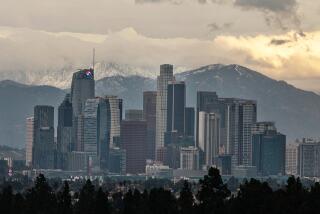Junk Bond Defaults to Increase Further
- Share via
NEW YORK — Ripples from the attacks on the World Trade Center and Pentagon will push corporate-bond default rates higher than expected and cause a wave of ratings downgrades in such hard-hit industries as lodging, gaming, retailing and media, Moody’s Investors Service Inc. said Monday.
Even before the attacks, 2001 was shaping up as the worst year for high-yield, or junk, bonds since 1998, when the sector was shaken by the Russian bond default and the collapse of giant hedge fund Long-Term Capital Management.
In August, 14 junk-bond issuers defaulted on debt totaling $4.7 billion, bringing the year-to-date total to $67.7 billion of defaults involving 173 issuers, according to Moody’s, the New York-based credit-rating agency. For all of last year, junk-bond defaults totaled only $49.1 billion.
“This year is going to turn out to be a massive, massive year [for defaults],” David T. Hamilton, Moody’s director of default research, said in a conference call for investors and news media Monday.
Moody’s previously had forecast that defaults for all ratings classes would peak next February or March at around 10% of bonds outstanding, Hamilton said. The effects of the attacks will cause the default cycle to peak later--probably around midyear--and the rate to reach 11%, he said.
Moody’s has downgraded to “negative” from “stable” the outlook for the hotel, lodging, gaming and ski industries. The shutdown of air travel in the wake of the attacks and the subsequent plunge in bookings will weaken the financial condition of companies that rely on airlines and cruise ships for their customer base, Moody’s analyst Keith Foley said during the call.
Ski resorts and other recreation businesses probably will step up their promotional activities, which will hurt the financial stability of some of the companies, he said.
Casinos also will be hurt, particularly in Las Vegas, which is more reliant on nonresident business than other gaming meccas, such as Atlantic City, Foley said.
Television broadcasters and print media have suffered from a sharp falloff in advertising since the attacks and--in the case of TV--a sharp reduction in ads for nearly 10 days after the attacks.
And more revenue-free TV is almost a foregone conclusion. “A U.S. response to the terrorists could result in additional noncommercial programming,” Moody’s analyst Christina Padgett said.
The attacks have caused many national advertisers to rethink their ad campaigns and in many cases to cancel them outright, she said. Radio and publications less dependent on national advertising will be less affected, Padgett said.
For retailers, at least in the short term, “the overwhelming story is negative,” Moody’s analyst Marie Menendez said. Although luxury stores may see their regular customers resume their normal buying patterns, marginal customers probably will fall away as a “less frivolous spending mood” arrives, she said.
A possible positive: Video rentals may increase as people look for relatively cheap, stay-at-home entertainment, Menendez said.
The junk-bond market already was having a bad year before the terrorist attacks. As of Aug. 31, Moody’s had downgraded about half of all the bonds that finished last year with non-investment-grade ratings.
The percentage of bonds rated B3--the Moody’s level at the top of the junk-bond category--or lower that has been downgraded is the highest ever, Moody’s said, surpassing the 40.9% rate set in the 12 months ended March 1991, in the wake of the last recession.
More to Read
Inside the business of entertainment
The Wide Shot brings you news, analysis and insights on everything from streaming wars to production — and what it all means for the future.
You may occasionally receive promotional content from the Los Angeles Times.










